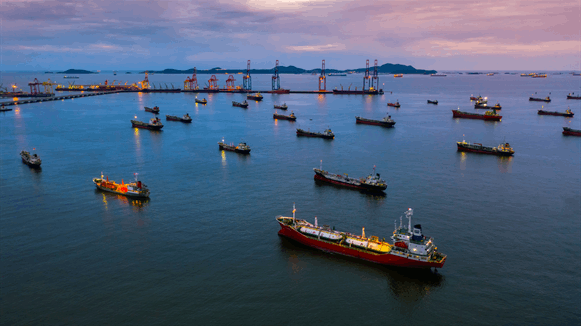United Nations Secretary-General Antonio Guterres on Monday called on governments to set more ambitious steps for the shipping sector to achieve carbon neutrality by 2050.
In a statement issued for a meeting of the International Maritime Organization (IMO), the head of the United Nations said: “The industry has seen some progress, but it needs to move much faster to get on track and drive investment and innovation”.
The IMO’s Marine Environment Protection Committee (MEPC) meets for its 80th session from Monday to Friday in London this week, with reviews of the sector’s decarbonisation roadmap on the agenda. maritime transport
The IMO’s current climate commitment is to reduce total annual greenhouse gas (GHG) emissions by 50 percent by 2050 relative to 2008 levels, which its “Greenhouse Gas Study greenhouse effect 2020” estimated to be 794 million metric tons of carbon dioxide (CO2) equivalent. The report for 2020, the latest edition, said shipping accounted for 2.89 percent of human-caused emissions in 2018, when the sector emitted 1.076 billion metric tons of GHGs.
“Humanity is in dangerous waters when it comes to climate. But the decisions it makes over the next few days could help us chart a safer path,” Guterres said.
“The science tells us that it is still possible to limit the increase in global temperature to 1.5 degrees Celsius. But it requires an immense and immediate global effort.”
He added: “I urge you to leave London having agreed a greenhouse gas strategy that commits the sector to net zero emissions by 2050 at the latest. And that includes ambitious science-based targets from 2030, both on the absolute reduction of emissions and the use of clean fuels”.
“These must include all greenhouse gas emissions and cover the entire value chain… I also urge you to commit to developing technical and economic policies and regulations to achieve these goals and support a transition fair and equitable,” Guterres said.
“Measures such as carbon pricing will push the industry in the right direction by making zero-emission fuels more competitive, while the funding generated can support the just transition in developing countries and address the needs of the most vulnerable to the climate crisis”.
The MEPC meeting is expected to adopt a more ambitious decarbonisation strategy, the UN agency IMO says in a preview of the event. “The revised IMO GHG Strategy will contain concrete greenhouse gas reduction targets for the sector and is expected to outline a basket of technical and economic measures to be developed to set global shipping on an ambitious path towards to the progressive elimination of greenhouse gas emissions”.
“As it continues to explore how to incentivize the availability and scalability of sustainable low- and zero-carbon marine fuels and technologies in the near future, IMO will continue to support developing countries, in particular small island developing States and to least developed countries with the aim of ensuring a just transition to low-carbon maritime transport that leaves no one behind and to take advantage of the development opportunities arising from the decarbonisation of the maritime sector”, says the IMO.
The meeting is expected to establish a working group on reducing global warming emissions from ships and another on energy efficiency in the maritime transport sector, according to the IMO.
The organization says it expects to adopt a revised roadmap for carbon neutrality on Friday.
Last month, the UN concluded years of negotiations to approve an agreement that would safeguard the high seas, or waters not under the jurisdiction of individual countries.
The pact “will enable the establishment of area-based management tools, including marine protected areas, to sustainably conserve and manage vital habitats and species in the high seas and the international seabed area,” it said. said the UN in a statement to the media on June 20. agreement “These measures are critical to delivering on the global ’30 by 30′ goal to conserve and effectively manage at least 30 percent of the world’s land and inland water areas, and marine and coastal areas by 2030 , as agreed in the Kunming-Montreal Global Biodiversity Framework”.
“It also provides, for the first time, an international legal framework for assessing the cumulative impacts of climate change activities and consequences, ocean acidification and related impacts, in areas outside national jurisdiction,” he said. add.
The treaty enters into force after ratification by at least 60 states.
To contact the author, please email jov.onsat@rigzone.com


